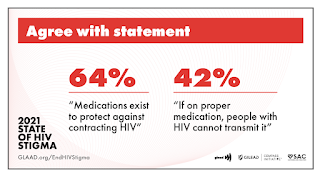By: Brandon M. Macsata, CEO, ADAP Advocacy Association
Is the United States' Ending the HIV Epidemic (EHE) being stymied by the American public's long-standing negative views on HIV/AIDS, largely fueled by misinformation and stigma? A recent national survey suggests the answer to that question is an unfortunate yes. The EHE initiative's four science-based strategies - Diagnose, Treat, Prevent, and Respond - apparently have an uphill battle against bigotry, fear and ignorance.
Less than half of the American public (48%) consider themselves knowledgeable about HIV, which is slightly less than polling done the previous year. One-in-two non-LGBTQ people surveyed (53%) expressed hesitation receiving care from an HIV-positive medical professional, and one-third (35%) held similar attitudes about an HIV-positive teacher.[1] These attitudes reflect opinions held in 2021, not 1981.
 |
| Photo Source: GLAAD |
The report, “The State of HIV Stigma 2021,” was spearheaded by GLAAD, Gilead Sciences and the Southern AIDS Coalition. Addressing the challenges laid out in the report, GLAAD summarized: "The findings reflect a vast lack of understanding of HIV and how it can be prevented, as well as significant discomfort and unfounded fear about people living with HIV. The Deep South has the highest rates of HIV diagnosis, yet the study reveals that the U.S. South also has some of the highest discomfort levels pertaining to the virus. This is a perfect storm for the perpetuation of misinformation."[2]
So much has been accomplished in the fight against HIV/AIDS since the 1990s with the advent of the highly active antiretroviral therapies (HAART), culminating with the growing acceptance of the science behind U=U ("Undetectable equals untransmissible"). Yet according to the GLAAD report, only 42% knew that someone properly following an antiretroviral drug regimen can’t transmit the virus.[3] If making U=U foundational in our efforts to end the HIV epidemic is required, then we have much more work to do.
 |
| Photo Source: GLAAD |
Sadly, among straight, cisgender respondents, half appeared to have closed to door to loving a partner or spouse living with HIV. HALF! Maybe even more troubling is over one-third of the LGBTQ community expressed similar reservations.[4]
The South and Midwest regions of the country reflected higher levels of these negative attitudes, which also correlate with a culture of shame and greater prevalence of HIV criminalization laws.[5] Stigma continues to be a major hurdle in the ongoing efforts to educate Americans about HIV/AIDS. These efforts are further hindered by the incendiary language used by Donald J. Trump about Haitian immigrants and AIDS, or the insensitive, homophobic language used by rapper DaBabby about people living with HIV/AIDS, or the cruel "clean" characterization used by men on gay dating and hookup apps and websites.
The media isn't without blame here, either. Approximately 6 in 10 Americans get their information about HIV/AIDS from the media.[6] Fortunately, GLAAD's report indicates "56% of non-LGBTQ respondents noted they are seeing more stories about people living with HIV in the media."[7]
"Measuring American attitudes toward HIV and the impact stigma has on people living with HIV" is at the heart of the GLAAD report,[8] and their efforts to monitor the country's mood on this issue is of paramount importance. The success, or failure, of the public policy strategies being employed to end the HIV epidemic will largely depend on combating negative attitudes, misinformation, and stigma.
[1] Kumamoto, Ian (2021, August 26). Half of Americans still don't know shit about HIV — and it's a real problem. MIC. Retrieved online at https://www.mic.com/life/people-know-even-less-about-hiv-than-they-used-to-according-to-new-research-84167181
[2] GLAAD (2021). 2021 State of HIV Stigma Study. Retrieved online at https://www.glaad.org/endhivstigma
[3] Avery, Dan (2021, August 26). Half of Americans say they’d avoid an HIV-positive doctor. NBC News. Retrieved online at https://www.msn.com/en-us/news/us/half-of-americans-say-theyd-avoid-an-hiv-positive-doctor/ar-AANM01E?ocid=st
[4] GLAAD (2021). 2021 State of HIV Stigma Study. Retrieved online at https://www.glaad.org/endhivstigma
[5] Avery, Dan (2021, August 26). Half of Americans say they’d avoid an HIV-positive doctor. NBC News. Retrieved online at https://www.msn.com/en-us/news/us/half-of-americans-say-theyd-avoid-an-hiv-positive-doctor/ar-AANM01E?ocid=st
[6] McCrea, Megan (2020, April 25). How the Media Shapes Our Perception of HIV and AIDS. Healthline. Retrieved online at https://www.healthline.com/health/media-and-perception-of-hiv-aids
[7] GLAAD (2021). 2021 State of HIV Stigma Study. Retrieved online at https://www.glaad.org/endhivstigma
[8] GLAAD (2021). 2021 State of HIV Stigma Study. Retrieved online at https://www.glaad.org/endhivstigma
Disclaimer: Guest blogs do not necessarily reflect the views of the ADAP Advocacy Association, but rather they provide a neutral platform whereby the author serves to promote open, honest discussion about public health-related issues and updates.

No comments:
Post a Comment